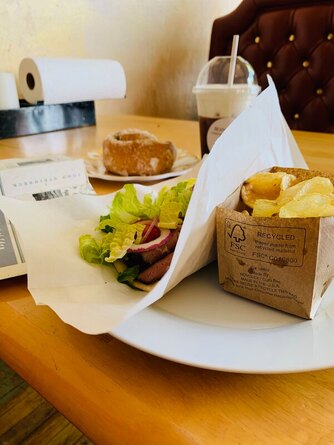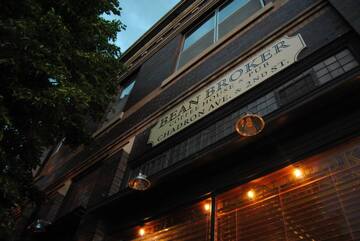"If we use a red onion in a recipe today, then we might pickle the left-over onion for something else tomorrow."  During my time studying English Literature at Chadron State College, I often found myself drawn to study in the comforting environment offered by The Bean Broker. I would sit in one of the comfortable chairs by the fire, drinking coffee and completing my readings for classes. The food is fresh and flavorful – often accented with the fresh herbs that the owners grow themselves in planters outside the iconic brick building. To quote recent graduate CSC alumni Alyssa Ermish, “I love the Bean Broker because of the relaxing communal space it provides. Some of my favorite memories and deepest conversations with friends have been over a cup of coffee there.” In addition to great coffee and delicious food, the Bean Broker offers Chadron a sense of community. They frequently host events such as open mic nights and support the performances of local musicians. As a customer, I was already aware that sustainability and waste reduction was a focus of their business, and eating at their establishment always felt like I was making a conscious choice to support a business that was mindful of ecologically friendly practices. But I was curious. I wanted to do some digging and find out additional information regarding the way the Bean Broker goes about achieving both their sustainability and community-related goals. I spoke with the manager, Alicia Felton, regarding the Bean Broker’s sustainable practices. One thing she emphasized throughout our talk, was the Bean Broker’s intent to feel open to everyone. “Our owners, Paige and David Feddersen, often say that they want the Bean Broker to feel open to everyone. Regardless of income, race, gender—we want this space to feel like your living room. We want you to feel at home here.” Felton also offered a great deal of insight into the efforts that they have made to create a sustainable business within our community: “One of the big things we’ve tried to do is cut down on plastic as much as possible. If people are interested in using a paper sack or a wax paper wrap over a plastic container, we make those available. Trying to use paper to-go containers—really any kind of paper products versus plastic containers for to-go items. We try of course, to implement paper straws. Early on, paper straws were both hard to come by and expensive. As time has gone on and paper straws have become more popular that has become more affordable. I also think that the Bean Broker does a great job as far at limiting the amount of food waste. For instance, if we use a red onion in a recipe today, then we might pickle the left-over onion for something else tomorrow. In the past, we donated food that was almost out of date to the masonic temple for the lunches they hold there. We aren’t able to do that as much anymore, just because we don’t have as much food waste as we used to.” Felton noted that their choice to implement a box garden for their herbs was a choice that allowed them to reduce plastic waste and promote fresh ingredients, which is directly connected to their environmental mission statement, “We have our own gardens out here, of course we wish they were a lot bigger. But we’re trying to utilize our own gardens to grow herbs for food and cocktails.” In addition to gardening themselves, the Bean Broker also serves as an excellent resource for local gardeners. According to Ann Marie Hendry of Growveg.com, utilizing coffee grounds as fertilizer is the right choice: “it turns out that coffee grounds contain a good amount of the essential nutrient nitrogen as well as some potassium and phosphorus, plus other micronutrients. The quantity and proportions of these nutrients varies, but coffee grounds can be used as a slow-release fertilizer.” In an effort to give back to Chadron and to reduce waste, the Bean Broker offers their leftover grounds to the community. Felton stated, “Many people come in to pick up coffee grounds for their gardens, and that’s something we offer for free to pick up. They are something we almost always have some of on hand – if not a full five-gallon bucket.” Many restaurants had to confront issues with additional food waste and sustainability during the onset of Covid-19 and the subsequent business closures. The Bean Broker was no exception. “Initially when that hit Nebraska, we were full of food, but we couldn’t utilize that food. It definitely impacted us in those first few weeks as far as the food that we had. We needed to find different ways to use it so that we could sell it to make sure we didn’t waste things there. One thing that was hard for the Bean Broker, was that we couldn’t take our fabric bags to the store. We buy a lot of things and when you have to come back with so many plastic sacks that’s detrimental for the environment.” However, during the closure, the Bean Broker also found that they were able to limit their menu in a way that reduced the amount of food waste they produced during the unusual circumstances caused by Covid-19. Felton and I discussed the Bean Broker’s decision to commit to more sustainable practice and she noted that, while their environmental business statement asserts that they are “committed to a role of environmental leadership and stewardship in every facet of our business” they had also made changes to the Bean Broker’s operation “primarily because Chadron consumers want it.” She spoke to the nature of the Chadron community’s dedication to purchasing from Earth friendly businesses, “It makes our business more approachable because the consumer recognizes that you’re considering those things. It’s not always financially the better way to go. Like I said, paper straws are getting cheaper but plastic straws are 10th of the cost. Financially, it takes more money from us. But we benefit by getting more of the consumer in because of it.” In this way, Felton’s comment draws attention to the fact that community members can create change by purchasing from businesses that support sustainability. Works Cited Hendry, Ann Marie. “A Common-Sense Guide to Using Coffee Grounds in the Garden.” https://www.growveg.com/guides/a-common-sense-guide-to-using-coffee-grounds-in-the-garden/. (2017). We offer a sincere thank you to the Bean Broker for their time and contribution to our site.
0 Comments
Leave a Reply. |
AuthorStef Glass is the Education Coordinator for Keep Chadron Beautiful. She graduated from Chadron State College with her BA in English Literature and minors in History and Creative Writing in May of 2018. Archives
June 2022
Categories |
Proudly powered by Weebly


 RSS Feed
RSS Feed